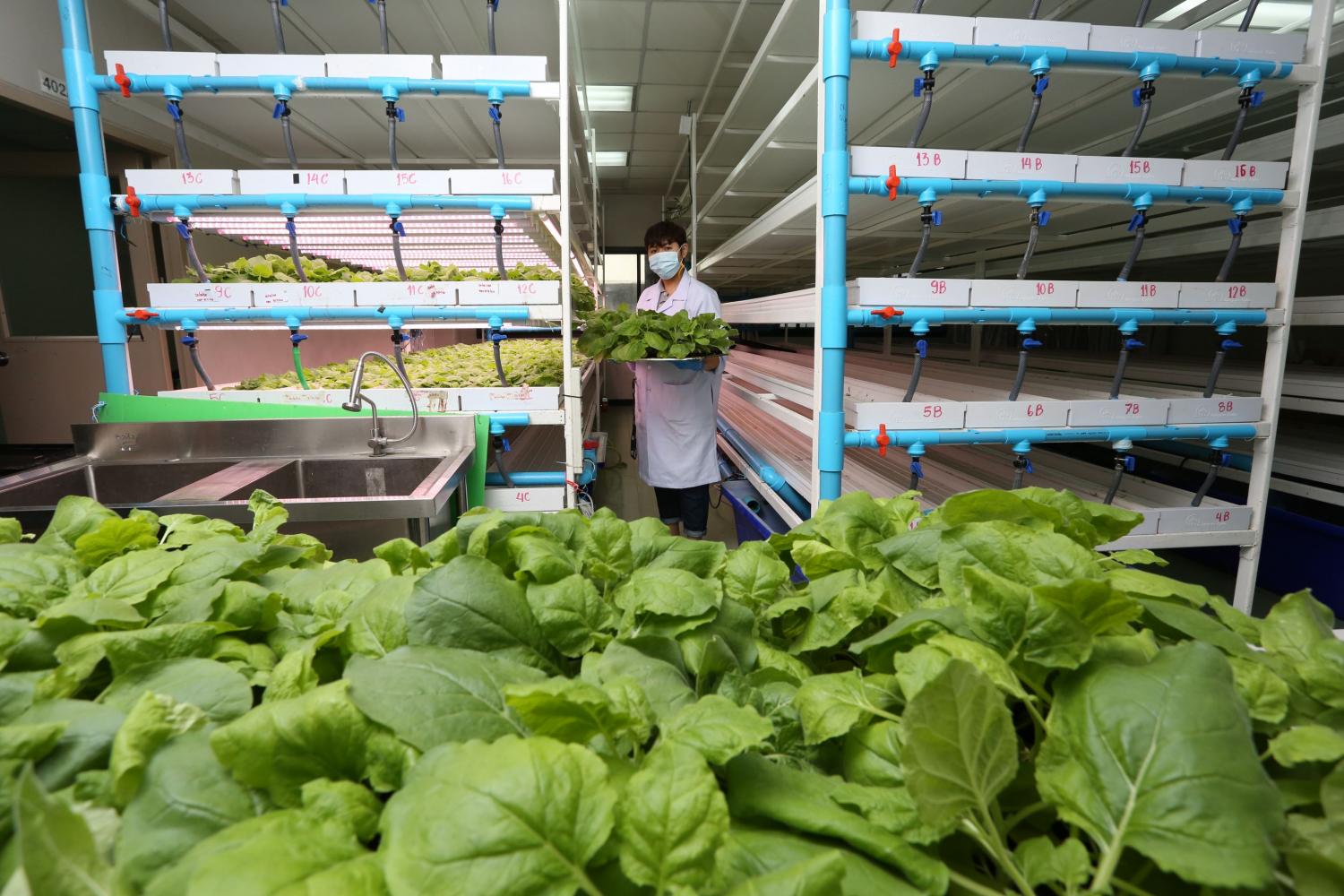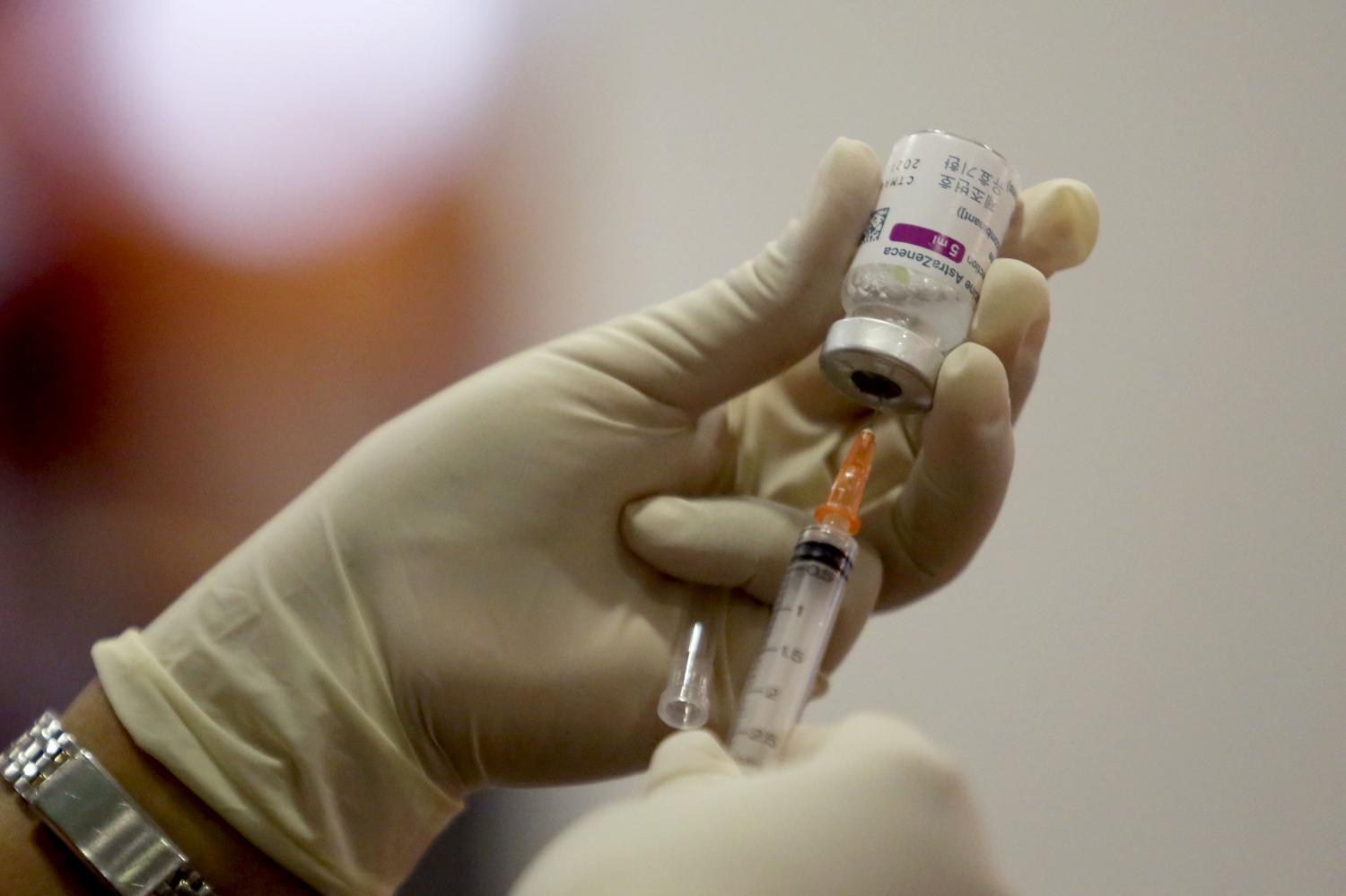
AstraZeneca vaccines, made by locally licensed Siam Bioscience, and a new Covid-19 vaccine being developed by Baiya Phytopharm Co mark a significant step for Thailand as a global player in the medical business.
These firms are paving a new direction for the country as companies with little to no background in advanced medical and pharmaceutical technology are encouraged to take part.
Some examples include national oil and gas conglomerate PTT Group, which is focusing on life science applications by developing new products in the medical field, while Siam Cement Group (SCG), Thailand's largest cement maker, announced it launched Asean's first polypropylene melt-blown resin for local production of face mask filters to prevent disease transmission and protect against PM2.5 ultra-fine dust.

A health worker holds a syringe and a vial of the AstraZeneca vaccine. (Photo: Wichan Charoenkiatpakul)
TOBACCO LEAF-DERIVED VACCINE
Baiya Phytopharm is preparing to test its Covid-19 vaccine on 100 volunteers in September, while also developing a second-generation jab to be used as a booster against virus variants.
"Our first vaccine is being made to fight the original virus while the second is being prepared to fight mutations," said co-founder and chief executive Suthira Taychakhoonavudh.
Researchers are using an Australian strain of tobacco with low nicotine traces in its leaves as a host to culture a genetically engineered protein.
They extract the protein from the leaves and use it to produce a vaccine that can stimulate antibodies to fight Covid-19.
This process can also be applied to make specific proteins as precursors for medicine and cosmetic products.
Ms Suthira expects the company to launch a new Covid-19 vaccine by the end of this year or early 2022.
Its vaccine production plant, located in Chulalongkorn University, is designed to produce 2 million doses per month at a cost of around 500 baht a dose.
Baiya Phytopharm is among 180 startups, several of which are in the medical field, under the CU Innovation Hub scheme run by the university.
In December last year, Baiya Phytopharm was granted a tax privilege by the Board of Investment for its investment of 3.94 million baht, with an aim to export 70% of its products.
HEALTHCARE PRODUCT ROLLOUT
Other companies are branching out with new businesses to supply the medical industry with a range of products from face masks to digital platforms that facilitate communication between patients and hospital personnel.
Roongrote Rangsiyopash, president and chief executive of SCG, said the company will focus on making high value-added products to join the trend in the healthcare business.
Polypropylene melt-blown resin developed by SCG Chemicals supports face mask production and reduces Thailand's dependence on imports of materials used in the healthcare industry.
PTT Group announced a similar plan to produce the materials used for the production of single-use medical face masks under a new company, jointly established by its two subsidiaries: Innobic (Asia) Co, a biotechnology firm; and IRPC Plc, a petrochemical firm.
The move is the company's "first business footprint" in the medical equipment industry, said Buranin Rattanasombat, chairman of Innobic (Asia) and PTT senior executive vice-president.
Materials made of non-woven fabric using the melt-blown technique are often used in N95 face masks, laboratory coats and air filter production, he said.
At present, Thailand imports these materials from abroad.
Mr Buranin said PTT also plans to develop Thailand's first cancer treatment drug factory under cooperation with the Government Pharmaceutical Organization.
The factory is slated for PTT We Cozi, the firm's flagship industrial estate in Rayong, with construction likely to begin in 2022 and the first doses expected by 2027, he said.
For its part, SCG developed an app to serve as an online clinic.
The app enables patients to meet doctors and nurses via video call and arrange appointments to meet hospital personnel.
RAPID GROWTH
These companies also plan to acquire shares in companies specialising in the healthcare field.
In April this year, Innobic (Asia) acquired a 6.66% share in Lotus Pharmaceutical Co, a company listed on the Taiwan Stock Exchange, as part of its long-term strategy to seek new business opportunities in the pharmaceutical industry.
Lotus is a generic medicine company with outstanding R&D facilities, said Mr Buranin.
The company makes and sells medicines in Taiwan, South Korea and the US.
Innobic (Asia) made the investment as part of efforts to strengthen the medical industry, he said.
"More than 60% of medicines and medical equipment in Thailand are imported," said Mr Buranin.
"We want to make products that can replace imports and help local manufacturers add value to their products."
Meanwhile, SCG Packaging Plc (SCGP) announced in late June it acquired an 85% share in Deltalab SL -- a manufacturer and distributor of medical supplies and labware in Spain.
SCGP said the investment in Deltalab will allow the company to apply its expertise in packaging technology, including polymer packaging, to the healthcare and medical business.
Global demand for healthcare and medical products is growing.
The market value is US$26 billion (around 856 billion baht) in Europe and $48 billion (around 1.58 trillion baht) in Asia-Pacific, according to Wichan Jitpukdee, chief executive of SCGP.